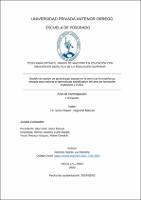Modelo de sesión de aprendizaje basado en la teoría de la enseñanza situada para mejorar el aprendizaje significativo del área de formación ciudadana y cívica
Abstract
Se realizó este estudio con el objetivo de mejorar el aprendizaje significativo del área de
Formación Ciudadana y Cívica en estudiantes del tercer grado de educación secundaria de
la I.E “Cartavio” mediante la aplicación de un modelo de sesión de aprendizaje basado en la
Teoría de la Enseñanza Situada.
La muestra estuvo compuesta por 44 estudiantes, divididos en dos grupos: un grupo
experimental donde se le aplicó cuatro sesiones de aprendizaje fundamentadas en los
principios y/o lineamientos didácticos de la Enseñanza Situada y un grupo control que siguió
con las actividades rutinarias.
Antes y después del experimento se evaluó la variable dependiente en sus tres dimensiones.
En el Aprendizaje Conceptual, se utilizaron dos pruebas objetivas para evaluar conceptos,
hechos y situaciones. En el Aprendizaje Procedimental, la lista de verificación permitió
evaluar la capacidad para elaborar proyectos participativos y su respectiva argumentación.
Finalmente, en el Aprendizaje Actitudinal, se aplicó una escala de actitudes en la evaluación
de conductas para el buen ejercicio ciudadano.
Los resultados obtenidos muestran los efectos positivos del modelo de sesión desarrollado
para el aprendizaje significativo del área curricular mencionada. Lo créditos y los mejores
resultados fueron obtenidos por el grupo experimental, siendo de menor trascendencia los
del grupo control This study was carried out with the objective of improving the significant learning of the
area of Civic and Civic Education in students of the third grade of secondary education of
the ““Cartavio““ IE through the application of a learning session model based on the Theory
of Teaching Located
The sample consisted of 44 students, divided into two groups: an experimental group where
four learning sessions were applied based on the principles and / or didactic guidelines of
the Situate Teaching and a control group that followed with the routine activities.
Before and after the experiment the dependent variable was evaluated in its three
dimensions. In Conceptual Learning, two objective tests were used to evaluate concepts,
facts and situations. In the Procedural Learning, the checklist allowed to evaluate the
capacity to elaborate participative projects and their respective argumentation. Finally, in the
Attitudinal Learning, an attitude scale was applied in the evaluation of behaviors for the
good citizen exercise.
The results obtained show the positive effects of the session model developed for the
significant learning of the aforementioned curricular area. The credits and the best results
were obtained by the experimental group, being of less importance those of the control
group


